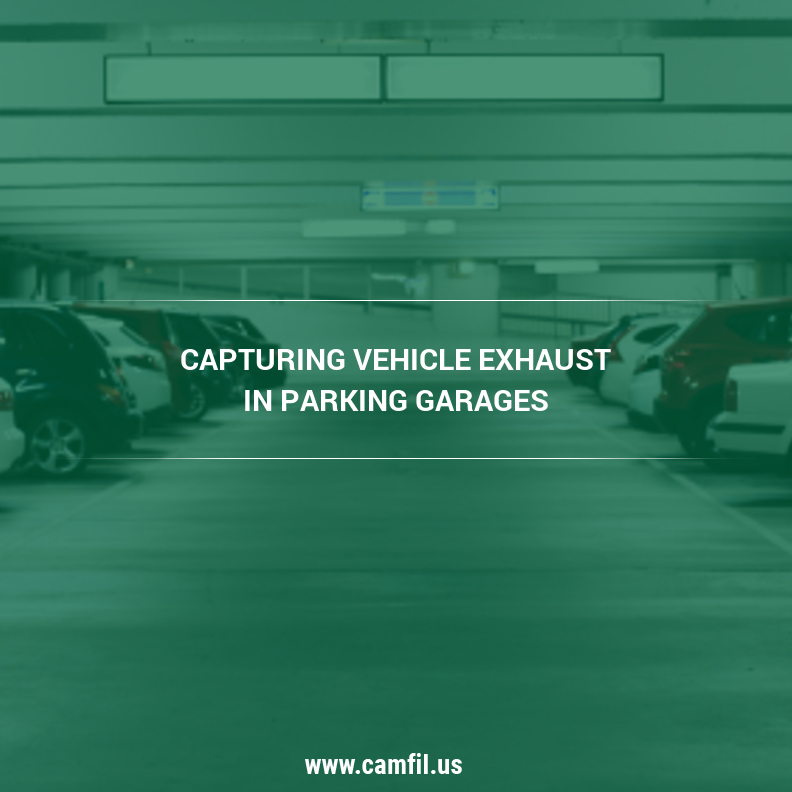Camfil Commercial Air Filtration News -In enclosed spaces like underground parking lots and vehicle garages, vehicle exhaust fumes pose a real health and safety risk, hence the need for an efficient commercial air filtration system. These ventilation solutions remove exhaust gases from an enclosed area and bring in fresh air from the outside, ensuring that vehicle emissions don’t linger and cause health problems, or worse, fatalities.
“Nearly a quarter of a century after deeming diesel exhaust ‘probably’ carcinogenic, the International Agency for Research on Cancer (IARC) has concluded that sufficient evidence now exists that it does indeed cause cancer in humans,” said Camfil USA’s Charlie Seyffer, Manager of Marketing & Technical Materials for commercial air filters and 37-year ASHRAE member and active committee participant. “While much research still needs to be performed on the relationship between diesel exhaust and cancer, one thing is certain: proper air filtration is effective at keeping diesel exhaust particles out of the indoor air is essential.”
But what exactly is it about exhaust fumes that make them so dangerous to human health?
The Dangers of Vehicle Exhaust and Need for Commercial HEPA Filter Air Purifiers
The need for commercial HEPA filter air purifiers in enclosed spaces like car parks, warehouses, and trucking facilities comes from the dangers posed by exhaust fumes. Automobile exhaust, for example, contains carbon monoxide produced by internal combustion engines, gas heaters, furnaces, and manufacturing equipment among others.
When a vehicle is moving and burning fuel efficiently, its engine receives enough oxygen to allow each carbon atom in the burnt fuel to bond with two oxygen atoms, forming harmless carbon dioxide (CO2). But when the engine does not get enough oxygen and burns fuel inefficiently, each carbon atom in the burnt fuel can only bond with one oxygen atom creating carbon monoxide. This typically happens when a vehicle is sitting idle with the engine switched on. Delivery trucks are common sources of vehicle pollution that travel into our buildings.
The accumulation of carbon monoxide happens in underground parking areas and indoor garages due to a lack of ventilation. It is estimated that around 20,000 to 30,000 people in the United States fall ill each year due to carbon monoxide poisoning. Approximately 500 people die from it every year. ¹
Do Commercial HEPA Filters Remove Vehicle Exhaust?
Commercial HEPA filters are just one part of a complete defense against vehicle exhaust fumes. High-efficiency particulate air filters are especially effective at removing particulate matter (PM) found in vehicle exhaust, especially from diesel trucks.
- Automobiles can produce PM directly from their exhaust pipes as a natural byproduct of the fuel combustion process—a common example is the soot that forms around the tailpipes of vehicles.
- Particulate matter can also come from the normal wear and tear on tires and brakes, which can leave dust particles in the air inside an underground car park.
But what about dangerous gases like carbon monoxide?
Enter Commercial Air Filtration Systems with Adsorbent Media
As mentioned earlier, a HEPA filter is just one part of your defense against vehicle exhaust pollutants. The other big issue is removing the dangerous and often colorless gases that accompany them. This is where commercial air filtration systems using adsorbent medias plays a factor.
While many underground car park facilities have smoke alarms that detect high levels of carbon monoxide (CO), nitrogen oxide (NOx), and other gas fumes, they don’t actually remove these harmful gases from the air. Molecular filtration systems are the only solution against gases found in jet fumes, diesel fumes, odors associated with equipment running on a gas-powered engine, volatile organic compounds (VOCs), and even restroom exhaust.
How Does Adsorbent Media in Air Filters for Air Purification Work?
The filter manufacturer will apply media that either adsorb gases molecules or remove them by a process that includes oxidizing the gases so they can be easily removed by other components of the filter system. Activated carbon can be used for diesel fumes and specific blends of oxidizing agents can be used to address the CO levels consistent with personal vehicle operation.
This oxidizing molecular filtration technology is especially effective at capturing other VOCs and carbon monoxide. In fact, gaseous filtration systems are commonly used in areas with air quality issues such as:
- Airports – to remove jet fuel and kerosene fumes
- Nuclear power plants – to remove traces of xenon, krypton, and iodine
- Pesticide and herbicide facilities – to remove processing emissions
- Food and beverage production facilities – to remove cooking fumes and odors
Choosing Industrial Air Filtration and Ventilation Systems to Remove Vehicle Exhaust
When choosing an air filtration and ventilation system for an enclosed car park or garage, it’s important to consider the size of the enclosed area, the number of vehicles the space accommodates, and the specifications of the air filter and ventilation system. Not all air purifiers are built the same, so it’s important to choose one that’s proven and tested.
To learn more about the benefits of air purifiers for removing vehicle exhaust fumes, click here to go through Camfil USA’s air filter catalog.
Media Contact:
Lynne Laake
Camfil USA Air Filters
T: 888.599.6620
E:Lynne.Laake@camfil.com
F: Friend Camfil USA on Facebook
T: Follow Camfil USA on Twitter
Y: Watch Camfil Videos on YouTube
Sources:
The post Are Commercial Air Filtration Systems Effective at Capturing Vehicle Exhaust? appeared first on Air Filters for Clean Air.

